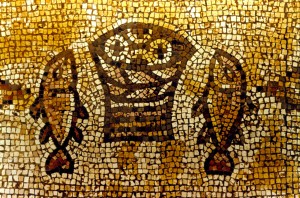 ‘Tis the season to be informed–sometimes in gentleness, often with vigor–by a variety of Christians claiming that it is wrong to celebrate Christmas. I have no desire to force anyone to celebrate Christmas against their will. Indeed, it would be insulting to the high holiday to pretend that it needs enforcement. It offers to Christians an opportunity for praise and thanksgiving for Christ’s incarnation, good music, family fellowship, the giving and receiving of gifts, and a great many other blessings. What more could anyone want? Taste and see that the Lord is good! (This doesn’t necessarily apply to the fruitcake, but you can participate in the thanksgiving without that!) If anyone, for reasons of conscience, wishes to abstain from the festivities, that is his or her right. But I am not willing to let go unanswered the all-too-common assertion that celebrating Christmas at home or in Church is somehow sinful and unreformed.
‘Tis the season to be informed–sometimes in gentleness, often with vigor–by a variety of Christians claiming that it is wrong to celebrate Christmas. I have no desire to force anyone to celebrate Christmas against their will. Indeed, it would be insulting to the high holiday to pretend that it needs enforcement. It offers to Christians an opportunity for praise and thanksgiving for Christ’s incarnation, good music, family fellowship, the giving and receiving of gifts, and a great many other blessings. What more could anyone want? Taste and see that the Lord is good! (This doesn’t necessarily apply to the fruitcake, but you can participate in the thanksgiving without that!) If anyone, for reasons of conscience, wishes to abstain from the festivities, that is his or her right. But I am not willing to let go unanswered the all-too-common assertion that celebrating Christmas at home or in Church is somehow sinful and unreformed.
What is a Christian committed to the Reformation Tradition to make of the objection to Christmas and other aspects of the Church calendar?
The Westminster Confession
According to Chapter 21, “Of Religious Worship and the Sabbath Day,” in addition to “ordinary religious worship of God” on the Lord’s Day, there are also “solemn fastings and thanksgivings upon special occasions, which are, in their several times and seasons, to be used in an holy and religious manner” (emphasis added). One of the prooftexts for this statement is Esther 9.22: “As the days wherein the Jews rested from their enemies and the month which was turned unto them from sorrow to joy, and from mourning into a good day; that they should make them days of feasting and joy, and of sending portions to one another, and gifts to the poor.”
Now how, pray tell, could one say more plainly that, in addition to the Lord’s Day, the Church may also set aside other days, as seem appropriate, to celebrate certain aspects of redemption? Is it not entirely proper, according to this paragraph, for Christians to observe a certain day for the celebration of and thanksgiving for our Lord’s incarnation as especially manifested in His birth to the virgin Mary?
Of course, we all know–and if we didn’t, we would soon learn, for we are incessantly reminded–that the Westminster Directory for Public Worship banned other festival days beside the Lord’s Day. But that is entirely irrelevant. No major presbyterian body in America ever included the Directory in their doctrinal standards, probably precisely because doing so would have made them beholden to such notions. What is conspicuous when comparing the Directory to the Confession is that the statements banning Christmas and other holidays are obviously missing from the latter document. The Confession does not ban Christmas, but considers it a viable exercise of religious liberty to observe it. Those who would appeal to the Directory insist that the statement in question is only supposed to give the Church the authority to call for single times of thanksgivings in response to special acts of providence. But the word, “seasons,” in its context, simply will not dictate such a restriction. Invoking original intent only evades the issue. If the correct answer to a question on a test is 1867, and I know the correct answer but write 1967 without realizing it because of habit (it is the year I was born), then my answer is wrong. I will lose the point because words and numbers have an objective meaning apart from intention (Otherwise, it would be impossible for a person to be put under an oath, since he could later maintain that his words only meant what he intended them to mean). In unclear cases, original intent matters. But when the meaning is clear, we cannot overturn what is said by our reconstruction of what the Divines would have meant to say. Otherwise, the Westminster Confession ceases to be our standard and we are left to the mercy of Church historians and whatever records they dig up. Words mean things and possess an objective force over against the ones who speak them as much as anyone else.
Furthermore, the Westminster Standards are compromise documents. The formulas we have are the ones which attracted the most votes. Indeed, they were formulas sometimes agreed upon between parties who disagreed over the theological issue. Thus, the Confession is intentionally vague on the question of supralapsarianism versus infralapsarianism, for example. To expect a monolithic authorial intent is totally unjustified. We know the Scots found themselves at war with traditional English Christianity in their desire to ban Christmas and other holidays. Some of the Divines agreed with the Scottish commissioners, but there is no reason to think all of them did.
Finally, Purim was an annual festival established by Mordecai and Esther, as recorded in Esther 9.22. Granted: the prooftexts themselves have not been adopted as part of our Standards. But if the meaning of the statement in question is to be interpreted by anything, the product of the Westminster Assembly which has been continually reprinted by the Presbyterian Churches along with the Confession and Catechisms certainly has more weight than the Directory for Public Worship.
All parties to this debate admit that the Church has the authority to call for special thanksgivings. What the “Scottish” party insists is that such authority is restricted to mere one-time celebrations, not annual festivals. Now, readers are invited to read the arguments for this restriction and see for themselves how much question-begging and special pleading is involved By what principle does the Church have the authority to make up ad hoc holy days and not establish regular ones? The “Lord’s Day only” principle should eliminate both. It is simply ridiculous to pretend that some wide gulf of principle separates the two cases. If calling for a special worship time is some sort of horrible infringement on Christian liberty then the occasional thanksgiving is no less immoral than the yearly “season.”
Francis Turretin’s Institutes of Elenctic Theology
In commenting on the Fourth Commandment, Turretin asks:
Fifteenth Question: Festivals
Whether it belongs to the faith in the New Testament that besides the Lord’s day there are other festival days properly so called whose celebration is necessary per se and by reason of mystery, not by reason of order or ecclesiastical polity only. We deny against the papists (Philipsburg, NJ: Presbyterian & Reformed, 1994, vol 2 p. 100).
Got that? It never crosses Turretin’s mind to say it is wrong or even unprofitable to observe a festival. He simply wants to be clear that this is a deliverance of Church authority, not a matter of the Faith per se, as is the Lord’s Day. In fact, the very way Turretin frames the question shows that he takes it for granted that it is within a Church’s lawful authority to establish a festival, as long as they don’t make it essential to the Faith.
He further elaborates:
The question is not whether anniversary days may be selected on which either the nativity, or circumcision, or passion, or ascension of Christ, and similar mysteries of redemption, may be commemorated, or even on which the memory of some remarkable blessing may be celebrated. For this the orthodox think should be left to the liberty of the church. Hence some devote certain days to such festivity, not from necessity of faith, but from the counsel of prudence to excite more to piety and devotion. However, others, using their liberty, retain the Lord’s day alone, and in it, at stated times, celebrate the memory of the mysteries of Christ… …we deny that those days are in themselves more holy than others; rather all are equal. If any sanctity is attributed to them, it does not belong to the time and the day, but to the divine worship. Thus, the observance of them among those who retain it, is only of positive right and ecclesiastical appointment; not, however, necessary from a divine precept (p. 101).
Turretin acknowledges some Reformed Churches do not observe any day but the Lord’s Day. I assume he means the Kirk of Scotland, which was always quick to pretend to being the most Reformed Church in the universe. Unlike Turretin, the Scots did not hesitate to demand that Christmas be banned in England, during the time of the Westminster Assembly. Thus, I can’t help wonder if Turretin doesn’t have the Scots in mind when he writes:
Hence we cannot approve of the rigid judgment of those who charge such churches with idolatry (in which those days are still kept, the names of the saints being retained), since they agree with us in doctrine concerning the worship of God alone and detest the idolatry of the papists (p. 104).
Now, Francis Turretin (1623-1687) is acknowledged as the master of Reformed Theology in his time. I suspect it is precisely because of such judicious determinations as the one I quoted above that he earned his reputation. He taught in the Academy of Geneva and was considered the guardian of the Reformed Faith in Europe, if not the world. By what right do people take for granted that the examples of the Scottish Kirk is determinative forever after of what constitutes the Reformed Faith?
Perhaps this all seems beside the point as far as Christmas is concerned. But I don’t think it is. Frankly, I question whether the anti-Christmas spirit depends on an argument from Scripture as much as a desire to he “more reformed than thou.” Or, to put it in a more general light, how much of the anti-Christmas spirit is spurred on by an all too common quest to be as radical as possible in one’s Christianity? Of course, if this entailed a desire to be radical for what the Bible actually teaches, it would be laudable. But to follow man-made rules instead, and consider these rules as the criteria for true commitment, will not lead to true maturity. Whatever the case, the invocation of an ostensible Reformed tradition seems heavily involved in the anti-Christmas spirit and seems worth examining in it’s own right.
The Second Helvetic Confession (1566)
The Festivals of Christ and the Saints. Moreover, if in Christian Liberty the churches religiously celebrate the memory of the Lord’s nativity, circumcision, passion, resurrection, and of his ascension into heaven, and the sending of the Holy Spirit upon his disciples, we approve of it highly (pp. 291-292).
Composed by Heinrich Bullinger (1504-1575), this confession was the most widely received among the Reformed Churches. The Scots took exception to the above statement, but no one else had any problem with it. Clearly, Christmas is highly approved in the Reformed Churches.
It is worth mentioning what leads up to the above-quoted paragraph. First of all, the Lord’s Day is given primacy as the time set aside for worship and rest “ever since the apostles’ time” (p. 291). After this affirmation of the Lord’s Day and before the affirmation of “the festivals of Christ,” we find the following paragraph:
Superstition. In this connection we do not yield to the Jewish observance and to superstitions. For we do not believe that one day is any holier than another, or think that rest in itself is acceptable to God, Moreover, we celebrate the Lord’s Day and not the Sabbath as a free observance (p. 291).
Thus, the churches receiving this confession did not simply assume that Romans 14.5, Galatians 4.10, and Colossians 2.16 refer to days in general, but rather to the religious calendar of the Mosaic economy, especially as perverted by the Pharisaic Judaizers who had infiltrated the Galatian church.. They rejected the notion that there was a divinely mandated cycle of annual festivals for the New Covenant age. But there was nothing in that rejections which made it a sin to set aside certain days for the “memory” of certain events in the life of our Lord.
The Synod of Dordt (1618-1619)
Unlike the Westminster Assembly, which was purely a national council (the six Scottish Commissioners were invited to join but decided they could have more influence if they worked solely as advocates of Scottish interests), the Synod of Dordt was the closest thing there ever was to a Reformed Ecumenical Council. Not only did the Synod rebut Arminianism in the five Canons of Dordt (from which we get our famous TULIP acrostic), but they also approved the Church Order of Dordt. This Church Order not only lacked any condemnation of Christmas, but decreed that their churches would celebrate it. Thus we find it has been passed down to the conservative Canadian Reformed Church as “Article 53. Days of Commemoration”:
Each year the churches shall, in the manner decided upon by the consistory, commemorate the birth, death, resurrection, and ascension of the Lord Jesus Christ, as well as His outpouring of the Holy Spirit(Book of Praise: Anglo-Genevan Psalter rev. ed. [Winnipeg, Manitoba: Premier Printing ltd., 1984, 1995], p. 670).
Again, if those who condemn the celebration of Christmas as sinful have some sort of clear argument from Scripture, then all of the above is superfluous. After all, if the Bible is against Christmas than all the statements in favor of it are altogether worthless. But, as I’ve said above, in my experience the alleged tradition of the Reformation is strongly invoked to generate plausibility for the banning of Christmas and other parts of the Church calendar. Thus, it is worth pointing out that such a tradition is neither the position of the Westminster Standards as received in the PCA, nor the product of the universal consensus of the Reformed Churches.
What Is Really the Issue?
In this debate, all parties are agreed that the Lord’s Day is the primary day of worship and rest in the New Covenant era. All parties are also agreed that the Lord’s Day is not the only day of rest and worship. The church has the right to worship on other days of the week.
Furthermore, there is nothing approaching a rational argument that proves it is wrong to regularly devote certain Sundays to certain subjects. Indeed, one of the most famous Reformation documents, the Heidelberg Catechism, is broken up into 52 sections so that it can be preached through annually. Even if the majority of Christmases were somehow barred by this principle, none of the Sunday holidays are the least bit questionable. For example, the whole cycle leading up to Easter is completely untouched by the “Lord’s Day only” claim.
Some will, in the name of the Reformed Faith, condemn Christmas because of the man-made hymns involved, or the lighting of candles. But these are questions about exclusive psalmody and whether lighting a candle violates the “regulative principle of worship.” They ought not be confused with the question of the Calendar itself. If there is something wrong with what is included in the worship of God on Christmas day, then those things should be corrected; but the question here is whether or not it is immoral per se to worship on December 25 as an annual celebration of the birth of Christ.
Another distraction is the anti-”papist” myth that Christmas comes from the Roman Catholic Church. If Christmas comes from “Romanism,” then so does the Trinity, Church marriages, and the doctrine of double predestination. The fact is, whatever the history of the holiday, it is Christ, not the pope, who is the reason for the season. To attribute Roman Catholic sympathies to Evangelicals who celebrate Christmas is to violate the Ninth Commandment, which, according to question 145 of the Larger Catechism, prohibits us from “misconstructing intentions, words, and actions.”
Ultimately, then, as I said above, the issue boils down to whether the Church can only call for emergency thanksgivings on the other six days of the week or if it has the authority to call for annual festivals. The question has already been answered admirably by the Westminster Confession and it’s prooftext! The book of Esther contains no mention of God, let alone a revelation from Him prescribing a new feast. Yet Mordecai and Esther do not hesitate to establish Purim.
Conclusion
More could be said on this issue, and I’m sure much more will be. My objective here was simply to point out that the Reformed Faith is much broader than the anti-Christmas contingent within it, and to show that accusing those who observe Christmas of sin is prima facie a groundless charge. We need better evidence from the Bible (if there is any) and better arguments, if we are going to avoid slandering brothers and sisters in the Lord




